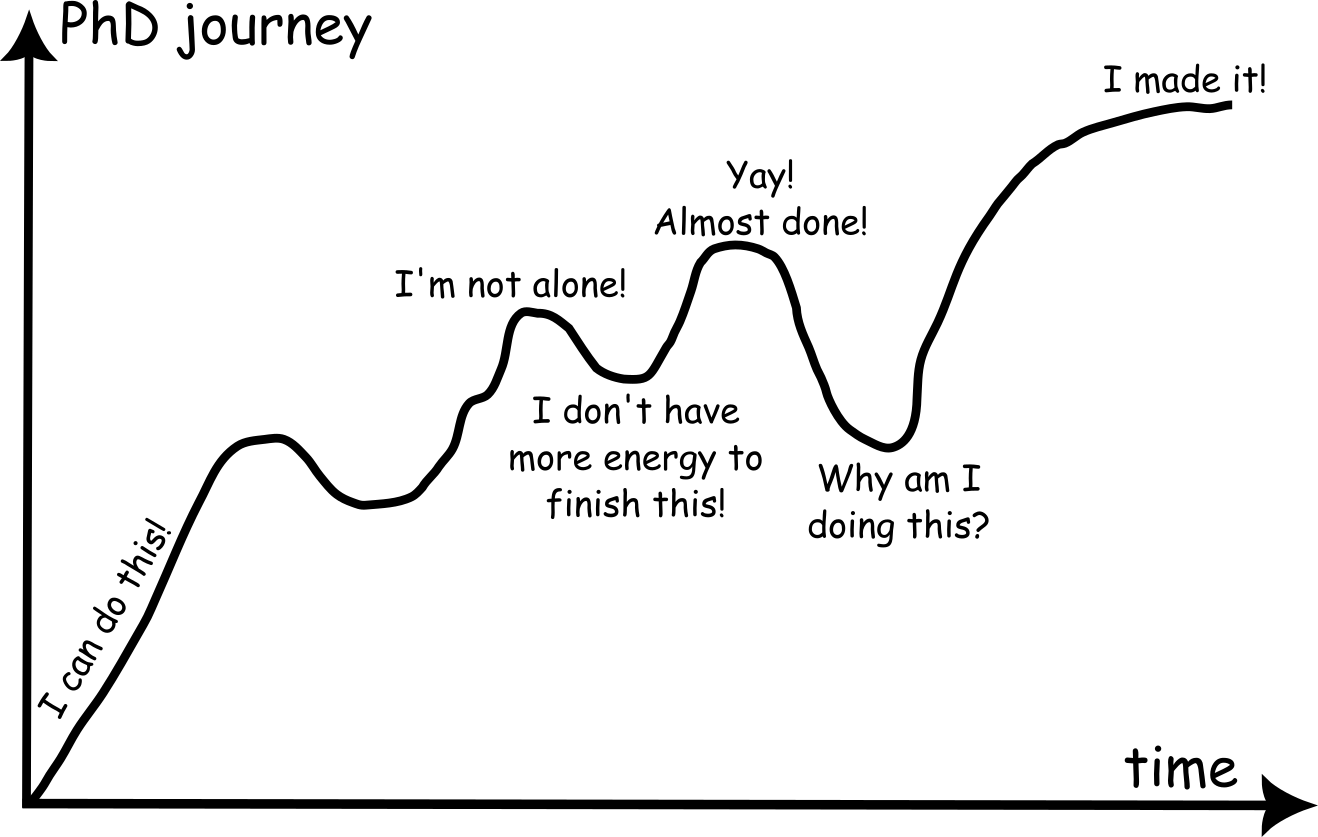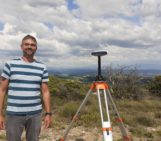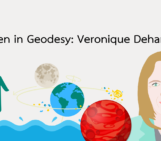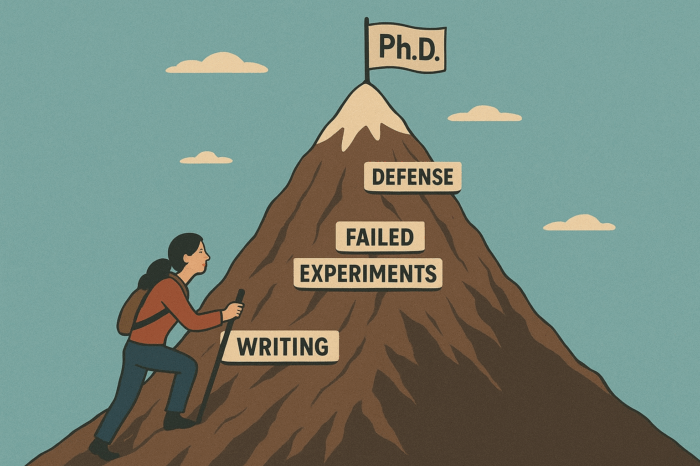
Imagine you are going on a long mountain tour. Your backpack is heavy, the path is steep, and although you have been walking for hours, all you can see ahead of you is the next climb. Doing a PhD is like climbing such a mountain. It can feel exhausting, there is always the next challenge ahead and the finish line seems to never get closer. Self-doubt and the feeling of not doing enough accompanies many PhD students along their journey. Experiencing these constantly and over a long period of time is likely to decrease our motivation, our productivity and ultimately our mental health.
Let’s take the opportunity of today’s World Mental Health Day to first of all acknowledge these struggles, to reflect on the reasons behind the feeling of constantly climbing but never doing enough and finally, let’s find out what you can do as a PhD candidate to make your research journey more enjoyable and mentally more sustainable.
The struggles of a PhD climb
Let us first say: You are not alone struggling! Many fellow PhD students we have been in touch with over the last years go through tough times – some for a shorter period, some even for years. So yes, the challenge is real.
When starting a PhD, many of us have no real idea of how the job is going to be. It is like setting out on a mountain climb without a map. A PhD journey is also a special one, as it is not only the job that needs to be done (for which you – hopefully – get more than a 75% payment), but also the research for the dissertation itself, often plus additional teaching and/or supervising responsibilities. Only after you have been climbing for a while, you find your rhythm and realize the actual weight of your backpack.
After managing the start, it is all about getting things done. But which one first? There are so many things at once that seem of great importance, so many paths to choose: checking out the latest data set, reading the paper on that new method, extending and speeding up your code, running further experiments, finishing that presentation, or writing the abstract for the next EGU General Assembly.
It might happen that you choose one path for a bit, go back, test another, and so on. Switching between several tasks costs our brain a lot of effort. It drains our energy and we might feel really exhausted after such days. We are left with the demotivating feeling that we did not really make progress and the summit seems not any closer. Do you know such days?
But there are also days when we manage to finish a task. We chose a path and walked till the end! Yay! However, as soon as we have reached the finish line, the next 5 (or more?) paths open up immediately, each of them as urgent as promising. Each step forward reveals no relief, but a longer list of climbs ahead. These endlessly unfolding tasks can make us feel that we are constantly behind, never doing enough.
Mental health during the PhD climb
When we keep walking and never put down our backpack, our mind and body have no time to regenerate. We get more and more tired, the energy drops. Long hikes become more difficult. We question whether we are on the right track at all and if we are able to manage this climb. Worries increase. Procrastination comes along and the less we get done, the worse it becomes. These are signs to take seriously! They are not there to put us down, but to remind us that we need to act, that we need to care for ourselves. Not next week or next month, but today. Because if we don’t act, the price we pay is our mental health. If we continue like this for too long, hopelessness and anxiety can increase, isolation and sadness are likely to come along. The thoughts of ‘not being good enough’ find their way into all areas of life and the goal we once started for seems unreachable. Burn-out is not far from here and recovery takes time. A long time.
So, what can we do to prevent ourselves from getting into that downward spiral in the first place? What can we do to sustain on our path with good health instead?
There are multiple options that we have. And before pointing out our strategies that we found helpful during our PhD journey, I would like to point out that not every option might work for you. And this is okay. So, while reading the following lines, I encourage you to look out for the tip that seems most helpful for you right now.
Taking good breaks
Let’s start with breaks. This might seem obvious, but we often forget the power of breaks. They are essential to restore our energy, both mentally and physically. Allow yourself to take breaks along your everyday climbs. A lunch break is essential, but also smaller breaks in between. (And yes, we believe this is part of your working time because how else could you work for 8 hours?) You might ask yourself regularly: Do I need a break right now? And if the answer is yes, what kind of rest do I need, and what kind of break will give me back some energy? Is it a sensory break away from any screen, is it a break for your body to stand up and stretch after sitting for a while, or is it a social break, calling a friend, having a coffee with a colleague? There are lots of ways to spend a break. Get creative, find out what kind of break suits you. This is also valid for longer breaks such as weekends or holidays. Our brain needs this time to relax to have good thoughts.
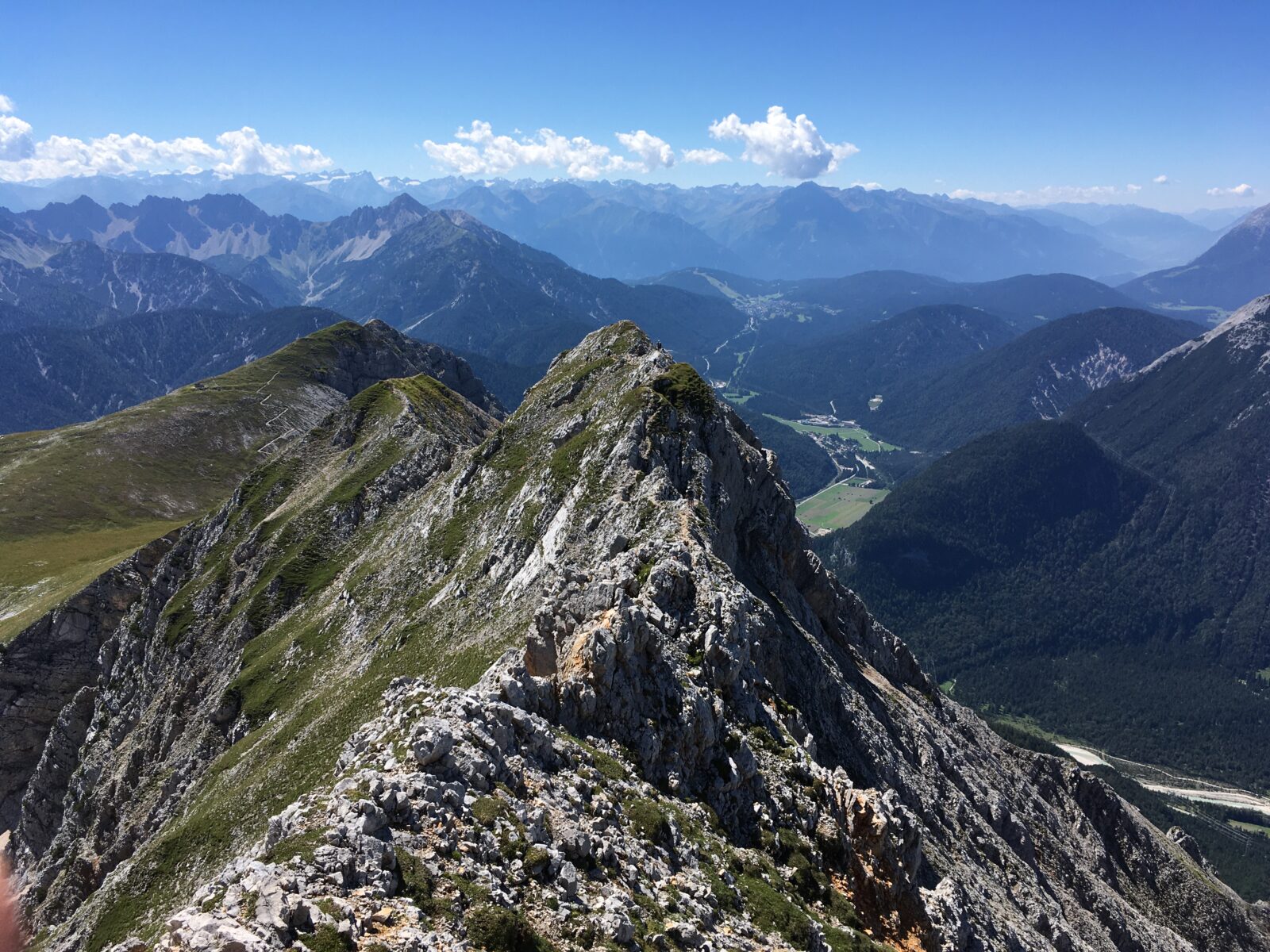
Taking a moment to pause, reflect, and appreciate how far you’ve come in your PhD journey – the mountains of challenges you’ve already climbed. Picture courtesy by Kristin Vielberg.
Break down your tasks
Then, let’s look at the use of subtasks. Subtasks help us to break down a large goal into small passages. Choose a passage and, if necessary, break it further down into subtasks until you feel comfortable starting. In the case of submitting your thesis, one task is submitting (at least) this paper. And while submitting a paper can still seem quite far away, finishing the introduction sounds more doable. Then, think of what needs to be done to finish the introduction. You might first define the paragraphs of the introduction, do literature research, take notes on each paragraph, draft each paragraph, edit your writing, etc.
Start with the first subtask and stick to it before moving on to the next one. This helps us to focus on one thing at a time and instead of reaching for a goal that is out of sight – the goal for now is finishing this passage. As it feels much more doable, it is more likely that we reach it.
It still might be the case that other tasks come to our mind while working on this. Instead of letting these new possibilities distract us from what we are up to right now, let’s take a moment to write it down to make sure you can get back to it later. In case the task you think of can be done within two minutes or less, do it immediately.
And after completing a passage, we encourage you to take a moment to put down our backpack. Allow yourself to acknowledge what you have just achieved. Even though it is only this subtask. You have made progress! You have reached the next stage towards your goal. And even though this seems like a small step, making progress feels good. This is what keeps us motivated. And look at this: the good days are usually the ones when we feel like we have made progress, aren’t they?
And if there is a bad day? That’s okay. Let’s see this as an opportunity to figure out what went wrong. Was the task too big? Were urgent tasks coming in? Was I just tired? And then ask yourself: What is the one thing that I can do differently tomorrow? Caring for ourselves starts in these small moments.
Join the community & find peers
Last but not least: You do not have to climb that mountain alone! You are not the only PhD candidate at your university or in your field. Look for peers to do a bit of the climb together. You might share your successes, but you might also share your failures. Because carrying the backpack together makes the climb a bit lighter and celebrating a view together can even make it a bit brighter 😉
Kristin and Hanna, two coaches and scientists who know from their own experience how demanding the path to a doctorate can be, made it their mission to empower PhD candidates and postdocs to navigate the challenges of academic life with confidence and clarity. With PhDpositive, they offer interactive science-based workshops and moderated peer groups on topics like resilience and stress management, healthy time and self-management, communication and self-efficacy for greater clarity and balance in everyday research life. Find out more on their website: https://phdpositive.de
And in case you feel like you need some deeper guidance, like a mountain guide along your climb, who supports you in mastering your challenges, coaching might be the right thing for you. Most universities offer consultation hours for scientists, and you can also contact Kristin and Hanna. We are happy to hear from you: team@phdpositive.de.
Take care and have a good climb!
Hanna & Kristin
– Edited by Rebekka Steffen

